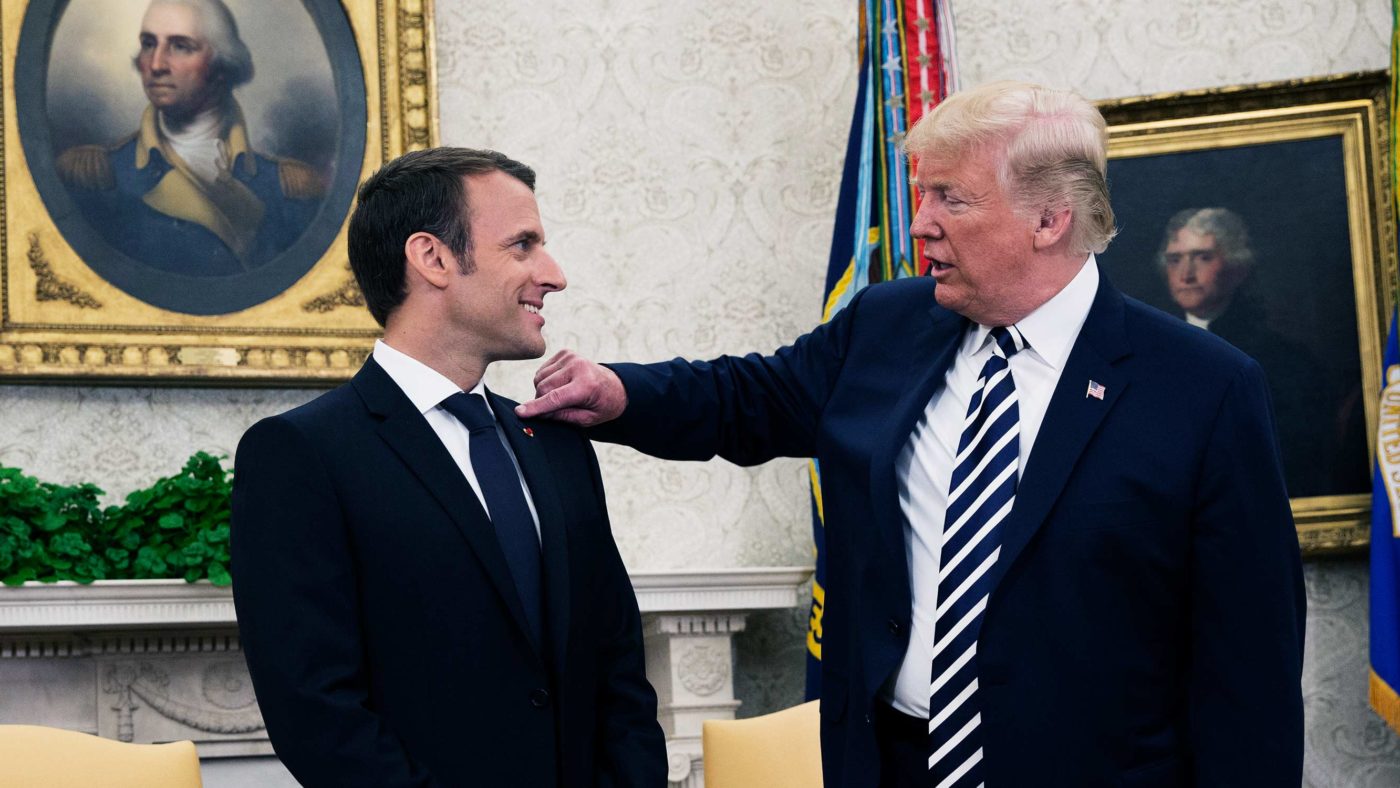The British papers are transfixed by Emmanuel Macron’s state visit to the United States. Is the Special Relationship dead? Has Trump thrown over Theresa May, the bit on the other side of the Atlantic that he once called “My Maggie”, for a perky younger model with a firm handshake? Is this the self-inflicted harm of Brexit?
No, no, and yes. The Special Relationship is only special to its junior partner. The ties of sentimentality, ambition and inferiority that bind Britain to the United States are still there. So is the useful work that Britain does in the fields of intelligence and light entertainment.
Often, the Special Relationship is special only in the way that the masochist’s taste for humiliation is special. At yesterday’s press conference, President Trump pretended to brush dandruff off President Macron’s shoulder. He was, of course, only joking. It was, of course, slightly degrading. You have to hope that the faux-French menu for the state dinner made up for it. Probably not. If you are French, goat cheese gateau with buttermilk biscuit crumbles and fake Champagne from Oregon sounds like another calculated piece of mockery.
It is not clear why the warming of relations between France and the United States is automatically bad for Britain. The French and the Americans fell out in 2003, when Jacques Chirac’s government did everything it could to trip up the Bush administration at the UN before the Iraq War. The rapprochement of 2011, in which the Sarkozy government, abetted by that of David Cameron, persuaded the Obama administration to bomb Libya, faltered as post-Gaddafi Libya collapsed. If the French and American leaders are friendly, so much the better for the Western alliance.
So much the worse for the Western alliance if the British prime minister is unable to advance the national interest in relations with the United States. May offered Trump a state visit after their first date, but then the House of Commons treated itself to an appallingly sanctimonious debate over whether Trump, the democratically elected leader of Britain’s closest ally, should receive a high honour afforded all the time to despots and torturers. That was embarrassing for May. In a really special relationship, it’s possible to be completely humiliated without getting what you want, either.
Macron is exploiting the temporary weakness of the two European countries to which the United States usually turns, Germany and Great Britain. Angela Merkel has one hand tied by her new coalition with the Social Democrats, and Theresa May has both hands to the pump as she tries to keep her government afloat and heading towards a Brexit that means Brexit, whatever that means.
Not that Macron is in a strong position. He was elected with a historically small slice of the vote, as the least worst alternative to Marine Le Pen. He seems to be more popular abroad than at home. The French economy is comatose as usual. Macron, now in the second year of a five-year term, is only beginning the confrontation with the unions that will either turn France into a model 1980s economy, or turn Macron into the public embarrassment that Sarkozy and Hollande became when they took on the unions and lost. Already there are strikes and protests.
Macron wants three things from Trump. The first, the impression that he is the political leader of Europe, he receives by default. The second, the development of technology and biotech business with the United States, is already underway, and cannot be harmed by Macron waving the flag. The third is for the United States to serve French interests in the Middle East. This will not be easy to obtain, and not least because France’s economic interests are at odd with its historic strategic interests.
France does not want to lose its influence over Syria and Lebanon, its former colonies, to Iran and Russia. Hence Macron’s enthusiastic participation in air strikes against Syrian targets after the chemical weapons attack on Dhouma. Yet France, along with Germany, was at the front of the line after Obama’s Joint Comprehensive Programme of Action (JCPOA) lifted sanctions on trade with Iran. Trump has threatened to abandon that “bad deal.” The European signatories, Britain, France, and Germany, want the deal to survive.
In other words, France wants to keep Iran happy at home and in its economic dealings with Europe, while making Iran unhappy in Syria. To achieve the first goal, Macron needs Trump to let the JCPOA to survive. To achieve the second, Macron needs Trump’s military support.
Macron’s answer, proposed at yesterday’s press conference, is to keep the JCPOA, even though he agrees that it is “not sufficient”, and add a “new deal”. This would convert the JCPOA’s ten-year suspension of Iranian nuclear activity into a permanent ban; limit Iran’s testing of ballistic missiles, which was not restricted by the JCPOA; and limit Iranian influence in Syria.
The chances of the Iranians agreeing to any of this are remote. Iran, empowered by the JCPOA, is on a roll across the region. It cost Trump nothing to say that “Emmanuel and myself have discussed the fact that we don’t want to give Iran open season to the Mediterranean.” No one does. It also cost Trump nothing to say, “We are discussing Syria as part of an overall deal.”
Trump may be a lout, but he’s not an idiot. Talk is cheap, and Macron is a cheap date. His assignation is all over the French papers, and the British are mortifying themselves because they know that Macron is trying to exploit uncertainty about Brexit. But it only made the front pages of the Wall Street Journal and the New York Times because Trump discussed Iran. That sounds more like a holiday fling. Perhaps Theresa May should consider one.


